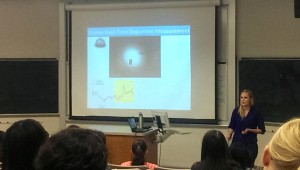Courses in the rotation:
Psych 200B Instrumental Conditioning
In this course we discuss the history and theory of instrumental conditioning. Topics include animal learning and conditioning and application of learning principles to goal-directed action, motivational processes, and goal selection in nonhuman animals.
Psych 112A Motivated Behavior
In this course we examine some of the basic processes underlying motivated behavior, stressing environmental determinants of behaviors such as feeding, drinking, and reproduction-related behavior. Discussions include the physiological and neural mechanisms that contribute to such behaviors. We consider topics such as reinforcement, acquired motivation, and drug addiction. Evidence obtained in laboratory studies conducted with animals is evaluated.
M101C Neuroscience from molecules to mind: Behavioral and cognitive neuroscience
Neural mechanisms underlying motivation, learning, and cognition.
Psych 110 Fundamentals of Learning
This course approaches learning from the behavioristic tradition that defines learning as the process that results in relatively permanent changes in behavior that are caused by experience. We will not focus on applied aspects of learning (e.g., study techniques), but will rather thoroughly examine experimental data and learning theory. We will primarily focus on the associative learning processes that govern the majority of our behavior. Our investigations will deal primarily with laboratory data collected from animals other than humans. The material in this course will start with defining of terms and build throughout into more complex concepts.
Psych 200B Instrumental Conditioning
In this graduate course, we cover the basic psychological processes underlying instrumental behavior.
Psych 204 Basic Motivational Processes
In this graduate course, we will discuss the neural circuits underlying motivated behaviors such as feeding, as well as maladaptive behavior such as addiction.
Psych 298 Grant writing
In this graduate course, I guide you through writing the specific aims and research strategy of a F31 NRSA grant.
UCLA Psychology Undergraduate Program
